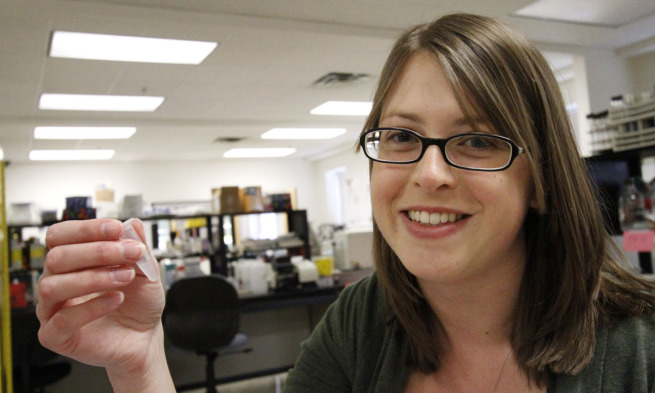Getting personal
Science and Technology
The study of genetics hits home for Carly Starke (’14)
By Brad Jenkins (’99)
On the difficult days — the ones when his muscles are quivering or when his short-term memory falters — Robert Starke finds strength more than 300 miles from his Clarksburg., N.J., home.Carly Starke (’14) is learning skills she may apply one day to help solve the mysteries behind diseases.
There, at a biotechnology lab at JMU, Starke’s daughter, Carly Starke (’14), is researching turkeys, specifically a vaccine to treat Bordetella avium, a form of avian whooping cough. It has nothing to do with her dad's multiple sclerosis, but the research and lab skills she is learning may one day help scientists treat MS and other diseases. Starke’s academic path is a source of strength for her parents, both of whom have faced medical challenges. Starke’s father was diagnosed with multiple sclerosis 30 years ago. Her mother is currently undergoing treatment for breast cancer; doctors found it early enough that her prognosis is excellent.
Performing in the Dance of Art and Science
As a science student who has enjoyed drawing since she was 5, Starke fit right in to the Dance of Art and Science, JMU’s yearlong use of the arts to explore genetics. For her, it all began with the dance on the Quad, which turned freshmen into a huge strand of DNA. There, she wore a yellow shirt and represented thymine, one of four DNA elements. “The dance connected everything I had learned in high school about DNA and showed how much JMU has to offer,” she says.
A large part of her Madison Experience will be learning to do genetic research. And if some diseases have genetic components, then Starke is optimistic that perhaps the cure to those diseases could be found in the genetics research she does later in life.
There is no cure for her father’s MS, which attacks the central nervous system and can range from mild to severe. The progress of the disease — which can include paralysis or loss of vision — is unpredictable. Its cause is unknown, but scientists wonder if genetics plays a role. Scientists already know that genetics can contribute to some forms of breast cancer. Women whose grandmothers, mothers or sisters have had breast cancer may have a higher risk, too.
Starke came to JMU enthusiastic to make a difference, partially because of her father’s illness. Involved in research with a vaccine-development company near her home during high school, Starke connected with Louise Temple, JMU professor of integrated science and technology, about helping with the professor’s research on respiratory disease in turkeys. Using molecular biology and biochemistry techniques, Temple and the students are trying to create a live vaccine that can immunize the turkeys.
JMU undergraduate research begins at freshman level
“Any research experience is valuable training,” says Temple, who adds that most students don’t start researching until they are juniors or later. “Our work, even though it is with poultry diseases, is relevant training for any kind of biomedical work she might choose later on. The techniques she is learning and practicing, the skills in literature critique, communication of scientific findings — all of these are extremely valuable for someone like her.”
Starke knows the value, and she’s grateful. “I am just a freshman, and I am already doing undergraduate research,” she says. “That goes to show how JMU gets students involved. I am doing work that juniors and seniors are working on, and I am understanding what's going on.”
More valuable, though, may be Starke’s understanding of how science will help others like her mother, who have breast cancer, or her father, whose MS symptoms are starting to show.
Starke’s father, an electrical trainer for a power company, has a mild form of MS. Over the years she has become more aware of the affects. Two years ago, his symptoms began progressing, and more people became aware that he has MS, which can have symptoms that come and go. He walks with an odd gait, and getting up stairs can be difficult.
When the motivation is hope
“I want to help my mom and dad,” says Starke. “I want to develop treatments and cures for other people, too, because I know what they’re going through.” Starke studies her science material with a personal curiosity, wondering what may be lurking in her own genes. And yet, she is resigned that there's no changing it. “Whatever happens, happens,” she says. “If it’s meant to be, it’s going to happen.”
Starke tells her parents about the research she’s doing, and even though it doesn’t pertain to their illnesses, it shows them that research can make a difference. “It encourages them,” she says. “They know there’s hope and that there are people like me in the sciences who are motivated to do something.” Robert Starke sees that motivation when he discusses science with his daughter. “Because of her passion for research, I have hope that one day she will find a cure or treatment and maybe solve mysteries of other illnesses,” he says. “I honestly believe that if there were more people with her passion, illnesses like MS and cancer would be cured.”
The research process also encourages Starke. She sees the successes and failures, and knows that sometimes the failures lead to success. “You may not find what you’re looking for now, but we have to keep trying because it may be out there."
